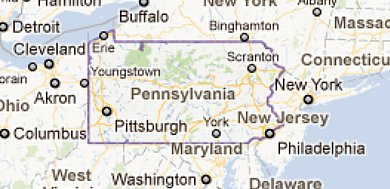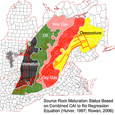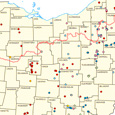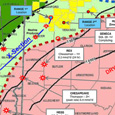Taxing shale drilling: Pa. legislation will provide more money for local governments
Monday, February 13, 2012

***Update as of Feb. 14, Pa. Governor Corbett signed the legislation as it was written. The bill now takes effect.*** To check out statements from the Pennsylvania Independent Oil and Gas Association or the Pennsylvania Association of Conservation Districts, just click on the links.
SALEM, Ohio — Legislation headed to the governor’s desk will have big impacts on the Marcellus shale industry in Pennsylvania.
Awaits gov’s signature
The state Senate passed the bill Feb. 7, and the House approved it Feb. 8. After the bill arrives at Gov. Tom Corbett’s desk, the governor, who supports the measure, will have 10 days to sign it into law.
The bill, if signed by the governor, will enact a impact fee on every well drilling for gas, retroactive to the first well drilled in the Marcellus formation.
Fee per well
In 2012, the drillers will pay $50,000 per well. Smaller vertical wells will be assessed $10,000. Legislators estimate the fee will generate around $180 million.
The fee will be different from year to year because it will be based on natural gas prices and the Consumer Price Index.
According to the legislation, 60 percent of the money generated will stay at the local level going to counties and municipalities with wells. The remainder of the funds will go to various state agencies.
Corbett started the proposal for new legislation in October 2011, following the work of the Marcellus Shale Advisory Commission. House Bill 1950 contains 24 of the legislative recommendations offered by the advisory commission.
“After long negotiations and a lot of hard work, we have reached a consensus on how to address the impacts in the Marcellus Shale regions,” Corbett said in a written statement. “I am very pleased with the cooperative spirit shown by the General Assembly and their staffs while working to resolve this complex issue. I look forward to signing this legislation into law.”
County government
The bill, if passed, will reportedly impact county governments and the Public Utility Commission.
According to the legislation, Pennsylvania counties will have 60 days to decide whether or not they want to enact a fee within their borders. If a county decides they don’t want a levy, they simply won’t hold a vote on the matter.
After the 60-day period ends, municipalities will have a chance to override any county government that decides to opt out of the impact fee. If a township or borough wants a fee, it will need to pass a resolution. If more than half of a county’s municipalities do this within 60 days, the county’s fee will be enacted.
The Public Utility Commission will regulate the fee and be the decision maker in deciding whether or not local governments’ drilling rules are reasonable, according to the legislation.
Sept. 1, 2012
The next big date to remember after the governor signs the legislation is Sept. 1, 2012. That day will be the due day for retroactive 2011 fees.
In addition, the bill requires that natural gas drillers release a list of the chemicals they are using in the hydraulic fracturing, or fracking, process. The deadline for making the chemical names public will be Jan. 1, 2013.
Hydraulic fracturing is a process commonly used in oil development.
The information will be required to be posted on the website FracFocus.org.
If by January 2014, the Department of Environmental Protection decides companies are not providing enough detailed information about the chemicals, then DEP may begin hosting the information on its website.
Jan. 31, 2013. In 2013, the Public Utility Commission will set the fee rates for 2012. Per-well fees are based on a sliding scale. According to the legislation passed, the PUC will set a rate based on two factors; changes in the Consumer Price Index and 2012 natural gas rates.
The fees for 2012 will be due April 1, 2013.
Not everyone pleased
Not everyone thinks this is a great deal for Pennsylvania. The group, Citizens for Pennsylvania’s Future, or PennFuture, spoke out against the bill.
“The bill adopts one of the nation’s lowest extraction fees, contains weak environmental protections over drinking water and our streams and wetlands, confers special stature on the drillers over other businesses in Pennsylvania, and destroys local rights to use zoning ordinances to manage drilling and withholds funds from any municipality that attempts to use those rights,” said Jan Jarrett, president and CEO of PennFuture.
“Pennsylvania citizens will get little in return.”
“We will live with the damage caused by drilling for decades, just as we still live with the damage from abandoned coal mines and shallow oil and gas wells across the Commonwealth,” Jarrett said. “And once again, the citizens of Pennsylvania will be stuck with the tab for cleaning up the mess.”




